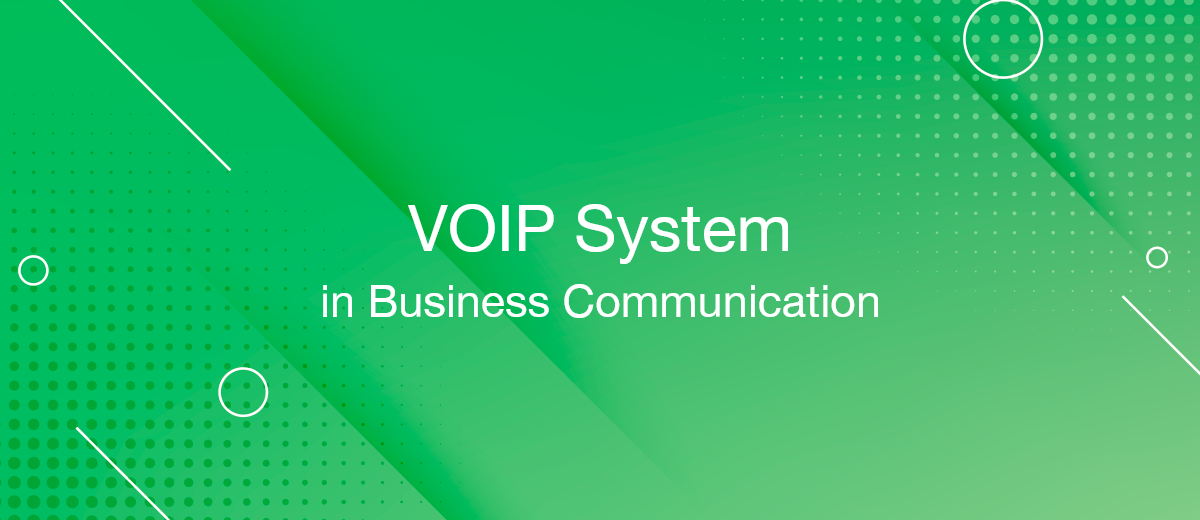How the VOIP System is Changing Business Communication
Effective communication is the foundation of thriving enterprises, impacting both client relationships and team collaboration. This is where Voice Over Internet Protocol (VOIP) systems step in. In this guide, we’ll explore the significance, business advantages, and steps to implement VOIP. Join me as we delve into how VOIP improves efficient, cost-effective, and adaptable business communication.
What is a VOIP System?
VOIP, or Voice Over Internet Protocol, is a pivotal player in communication technology. But what is a VOIP system and how does it work? At its core, VOIP converts spoken words into digital data, transforming your voice into a stream of ones and zeros that travel over the internet. Here's a simplified breakdown:
- Voice Transformation: When you speak into a VOIP device, it captures your voice and translates it into data packets, like digital puzzles.
- Internet Journey: These packets traverse the internet's extensive network, much like emails and cat videos.
- Reassembly at Destination: At the recipient's end, data packets are reassembled into your original voice, akin to solving digital puzzles.
A standout feature of VOIP is its cost-effectiveness. Utilizing your existing internet connection, it offers budget-friendly communication compared to traditional phone systems, akin to using Wi-Fi for chats without depleting phone plan minutes. Now that you know the basics of VOIP systems, let's explore why it's the preferred choice for businesses of all sizes.
Benefits of VOIP in Business Communication

Adopting VOIP systems is now essential for business communication. These systems offer numerous advantages that redefine business connectivity and collaboration. Here are some of these benefits:
Cost Savings
Traditional phone systems often incur hefty bills, particularly for long-distance or international calls. VOIP, using the internet as its foundation, reduces call costs significantly, helping businesses cut communication expenses while gaining positive ROI.
Reliability
VOIP systems now provide high reliability with stable internet connections, reducing downtime. Businesses can rely on VOIP for uninterrupted communication, be it for customer support or professional services. For example, live coaches using VOIP systems can focus on honing their coaching skills rather than worrying about timely information delivery.
Scalability
Business environments are dynamic, and growth is a common objective. VOIP systems are highly scalable, effortlessly accommodating the needs of growing businesses, whether you have two users or two hundred, without major overhauls.
Flexibility
VOIP provides unmatched flexibility for remote work, allowing employees to make and receive calls from anywhere with an internet connection, making it ideal for distributed teams and remote workers.
Integration
VOIP systems seamlessly integrate with other business tools like customer relationship management (CRM) systems and email platforms. If you're wondering which B2B business and marketing tools will integrate smoothly with your VOIP systems.
Enhanced Features
VOIP systems are feature-rich, streamlining communication with call forwarding, voicemail-to-email transcription, video conferencing, and virtual phone numbers. These features enhance productivity and interaction quality with clients and colleagues.
Environmental Benefits
VOIP contributes to sustainability by reducing the need for physical phone lines and hardware, cutting electronic waste and energy consumption, making it an eco-friendly choice.
Geographical Flexibility
VOIP enables seamless global connections with customers, partners, and employees, opening new markets and opportunities. It also eliminates specific marketing constraints, facilitating smoother global communication between brands and loyal customers, thereby enhancing ambassador marketing.
All these benefits make VOIP a compelling solution for businesses of all sizes. In short, it revolutionizes communication, enabling more efficient and competitive operations. Now that we've explored the benefits of VOIP systems let's delve into the implementation process.
Implementing a VOIP System
Looking to transition to VOIP and reap its business benefits? Here are practical steps for a successful implementation:
- Automate the work of an online store or landing
- Empower through integration
- Don't spend money on programmers and integrators
- Save time by automating routine tasks
1. Assess Your Needs
Start by understanding your business's specific communication requirements. Consider factors like the number of users, expected call volume, and desired features.
2. Select a Reliable Provider
Choose a reputable call center software with VOIP services that align with your business needs. Look for providers with a track record of reliability, good customer support, and a range of features.
3. Ensure a Stable Internet Connection
A reliable internet connection is crucial for seamless VOIP operation. Verify that your internet service meets the bandwidth requirements for your anticipated call volume.
4. Set Up Quality of Service (QoS)
Prioritize VOIP traffic on your network to ensure high call quality. This involves configuring your network equipment to give priority to voice data.
5. Choose the Right Hardware
Decide whether you'll use IP phones, softphones (software-based phones), or a combination. Ensure that the chosen hardware is compatible with your VOIP system.
6. Configure Security Measures
Implement security protocols like encryption and firewall settings to protect your VOIP system from potential threats.
7. Test and Train
Before fully deploying, conduct thorough testing to identify and resolve any issues. Provide training to employees on how to use the new system effectively.
8. Establish Redundancy and Backups
Have contingency plans in place for power outages, internet failures, or any unexpected issues. This may involve backup power sources and redundant internet connections.
9. Monitor and Maintain
Regularly monitor your VOIP system's performance. Address any issues promptly and keep up with software updates to ensure optimal functionality.
10. Evaluate and Adapt
Periodically review your VOIP system's performance and assess whether it still meets your evolving needs. Be open to making adjustments or upgrades as necessary.
By following these steps, you'll be well on your way to implementing a VOIP system that enhances your business communication capabilities. Remember, a well-planned transition ensures a smooth and productive experience for both your team and your clients.
Conclusion
VOIP isn't merely altering business communication. It's revolutionizing it. Embracing these advancements equips your business to adapt, collaborate, and thrive in a rapidly evolving corporate world. VOIP represents both the present and the future of business communication, offering boundless possibilities for connectivity and success.
Apix-Drive will help optimize business processes, save you from a lot of routine tasks and unnecessary costs for automation, attracting additional specialists. Try setting up a free test connection with ApiX-Drive and see for yourself. Now you have to think about where to invest the freed time and money!


